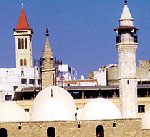“Muslims and Christians Together for Jerusalem's Sake”
Interview with Rev. Dr. Riad Jarjour
What was the social and political atmosphere which instigated this meeting of Christian and Muslim religious leaders?
Now, as in the past, Jerusalem is exposed to many dangers which threaten its unique pluralistic character as well as the people of all three religions. Its personality as an Arab city is also under severe threat.
Israel's claim to sole possession of it endangers its Arab Palestinian people, both Muslim and Christian. These are people who suffer from a variety of Israeli abuses which contest their basic rights—rights to practice religion, property rights, freedom of movement, and especially their right to dignity.
These are realities which date from Israel's occupation in 1967. What makes them more dangerous than ever is that, as they persist, the pluralistic future of the city is threatened. As Arab Muslims and Christians, this inspired us to articulate together a distinctive voice in defense of Jerusalem, a city which has proved itself capable of transcendence.
Why was the meeting significant with respect to Christian-Muslim relations and what was its significance on a broader scale?
The meeting was a remarkable step forward in building a bridge between two faith communities. It had a marvelous positive impact, which is remarkable considering that the gathering was convened by a group of indigenous Christian organizations.
The most important thing about the conference was that Arab Christians were able to authenticate themselves in the region as Arabs. The fortunes of the region concern Christians just as much as they concern Muslims and they are integrally indigenous to the region; not a community tied to the apron strings of western Christianity.
And I might add that churches and religiously sensitive groups in the west should realize that, for any interreligious dialogue relating to the Middle East to bear fruit, it must begin with and grow out of a dialogue among the indigenous communities of the region.
On a broader scale, the conference stimulated optimism and improved understanding between Christians and Muslims, and it continues to do so. It also succeeded in breaking down some of the stereotypes and misunderstandings about both religions. It encouraged cooperation in combating conditions and trends which both religions condemn in the areas of thought, personal conduct, socialization and politics, and I think that all of this will aid in stimulating mutual understanding, cooperation, mutual affection, and peace in the world.
How was the Jerusalem Appeal received by officials in the Israeli government and in the PNA?
Let me first say that the event was welcomed in Lebanon with a really stimulating warmth—officially, politically, socially and culturally.
It also was well received in the Arab world, and the media said it gave a unique power to the Arab summit of political leaders which came 10 days after the Jerusalem Conference.
The PNA received it well. President Arafat referred to it in detail during the summit and he also sent a letter of appreciation to the MECC.
We never heard directly from the Israeli government.
We had a mixed response from the international community. It was mostly positive, but you must understand that we focused most of our efforts on the local community.
What was the effect of the conference upon the atmosphere in Jerusalem and the occupied territories?
It had a very good effect on the atmosphere in the Holy Land. Local radio stations and news agencies reported about it well. Its impact was widely felt and it reinforced the solidarity of all Arabs, whether they be Christian or Muslim.
What plans does the MECC have to continue dialogue between Christian and Muslim religious leaders?
Our program must now focus its work on the matter of dialogue itself. Dialogue must begin to bear fruit on the local level. Everyone must grasp its positive contributions, and a sense of shared existence must emerge in love, in brotherhood, and in peace.
In the future, the programÕs work will link together the concerns of the Arab Working Group on Christian-Muslim Dialogue with the Council's other programs, such as those dealing with rehabilitation and reconstruction.
The plan for 1997 includes work camps for youth stressing education for peace, a workshop on “Democracy and Human Rights,” raising awareness among social groups on the local level, and exchanges of ideas and experiences.
Our dialogue remains sincere, open, heartfelt, and directed towards meeting our common goals.
Interview by Jeff Leard. First appeared in MECC NewsReport , January/February 1997 |
